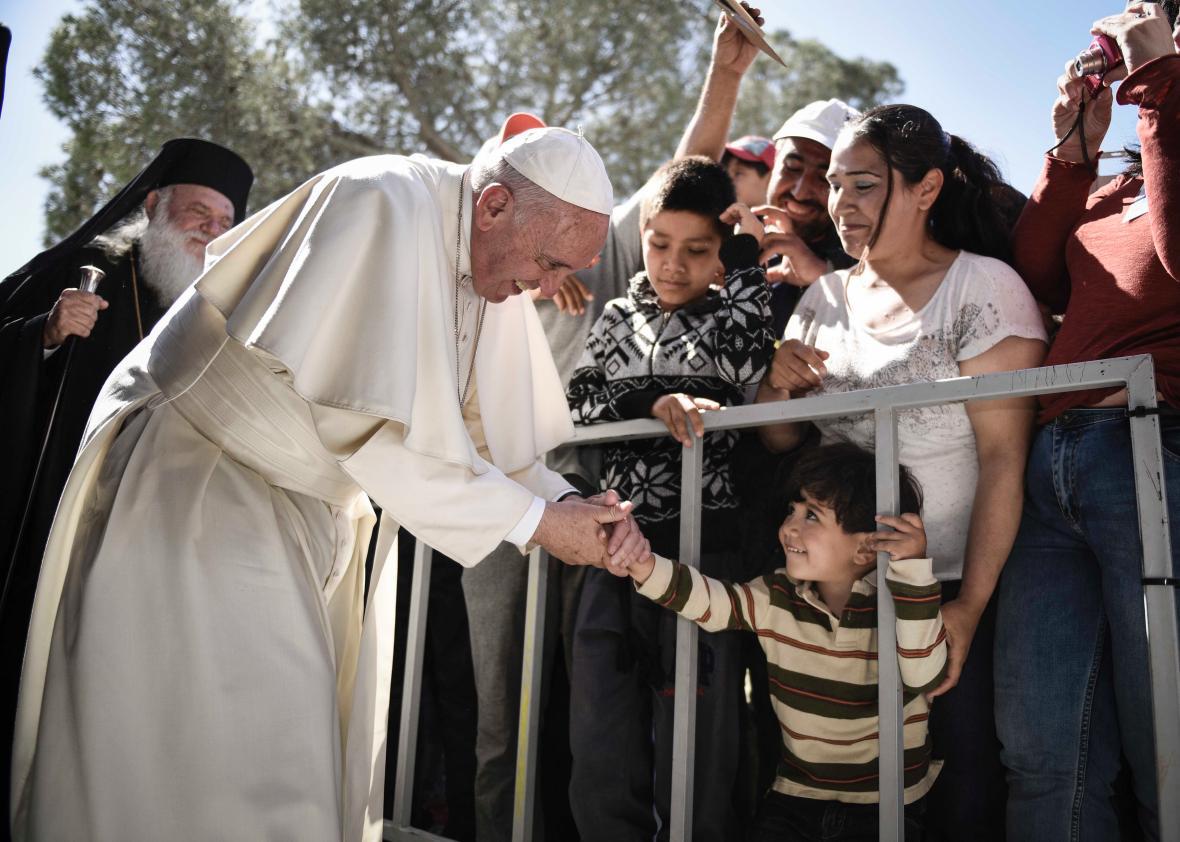Last weekend Pope Francis traveled to the Greek island of Lesbos, where hundreds of thousands of Syrian, Afghan, and Iraqi migrants have passed through since last summer as part of what he called “the greatest humanitarian catastrophe since the Second World War.” The five-hour trip to Lesbos included the usual papal routine, including greeting the public and meeting with other religious leaders. But this visit had a surprise ending: When the pope returned home to the Vatican, he took 12 Syrian refugees with him.
It’s obviously unusual for a head of state to whisk away a group of refugees and arrange for their care indefinitely, as the Vatican has said it will do. The three families were selected by lottery, which gives the act of charity a frisson of the carnival-esque. But as weird as the pope’s gesture may have seemed at first, it is also a pointed rebuke to the EU’s punitive policies toward migrants. It’s a gesture that’s meaningful both politically and personally.
The centerpiece of the weekend’s brief trip was a tour of a detention center where thousands of migrants are held behind barbed-wire fences while their applications are processed. Thanks to a controversial new European Union policy, many of those migrants are now slated to be deported from Greece to Turkey. “We hope that the world will heed these scenes of tragic and indeed desperate need,” the pope told a crowd on the island, “and respond in a way worthy of our common humanity.”
Returning to Rome just a few hours later, he brought with him three couples and six children, all from Syria and all Muslim. The logistics of whisking three families off to a new home were obviously complicated. As the Catholic News Service reported Monday, the Vatican got help screening refugees to find families to whom both the Greek and Italian governments would agree to quickly grant all the required travel papers. The Greek government required it to narrow its search to families who arrived in Greece before March 20, when the new EU agreement with Turkey went into effect. (That ruled out a Christian family who had arrived later.)
The process moved quickly. One of the men selected by the Vatican, Osama, told the news service that he was informed at 10 p.m. on Friday that he, his wife, and his two children would be leaving Lesbos with the pope the next day. He was at the grocery store when he received the call. The families’ initial care will be arranged by the Community of Sant’Egidio, a charity that will host them while longer-term housing is secured in the Vatican, and will help the parents look for work.
The pope has made the European migration crisis one of the signature issues of his pontificate. In 2013, he made his first visit outside Rome as pope to meet with African migrants on the Italian island of Lampedusa. Last year in September, speaking to a crowd of thousands in St. Peter’s Square, he called on every Catholic parish in Europe to take in at least one family fleeing to the region. At the same time he announced the Vatican would take in two families under its care. The three new families from Lesbos bring the total number of refugees living in the Vatican to about 20, according to the AFP.
But if the pope’s action this weekend was a symbolic continuation of a political agenda, it also had immediate and real effects for the Syrians who returned with him to Rome. Hasan, an engineer from Damascus whose family fled to Turkey and then set out for Greece in a crowded rubber dinghy, called Francis a “savior.” Wafa, Osama’s wife, told the Italian newspaper La Stampa that her 6-year-old son has barely spoken since the family’s home in a Damascus suburb underwent a series of bombardments. “He is locked in an impenetrable silence,” she told the paper. The family hopes for a fresh start in Europe. “Francis gave us a new life,” she said.
